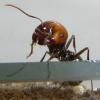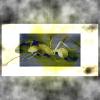- Formiculture.com
- Forums
- Gallery
- Members
- Member Map
- Chat

Are ants less intelligent than other solitary insects?
Started By
DEAD_DOG
, Apr 26 2024 6:45 PM
7 replies to this topic
#1
 Offline
-
Posted April 26 2024 - 6:45 PM
Offline
-
Posted April 26 2024 - 6:45 PM
I feel like ants have always been seen as a fairly intelligent since they are social insects that work together in groups and what not, but since they are simply drones that are entirely expendable, are they less intelligent than insects that are solitary? On one hand, considering that they show impressive abilities, like working together and building intricate nests, it would make sense to assume that they are intelligent, if not more so then solitary insects, but at the same time is a lot of this just instincts? Also, does anyone know what a prefix on this app is? I’m using the Tapatalk mobile app and it keeps asking me if I want to add a prefix.
Sent from my iPhone using Tapatalk
Sent from my iPhone using Tapatalk
#2
 Offline
-
Posted April 26 2024 - 6:47 PM
Offline
-
Posted April 26 2024 - 6:47 PM
by the way to clarify I’m referring mostly to the worker ants.I feel like ants have always been seen as a fairly intelligent since they are social insects that work together in groups and what not, but since they are simply drones that are entirely expendable, are they less intelligent than insects that are solitary? On one hand, considering that they show impressive abilities, like working together and building intricate nests, it would make sense to assume that they are intelligent, if not more so then solitary insects, but at the same time is a lot of this just instincts? Also, does anyone know what a prefix on this app is? I’m using the Tapatalk mobile app and it keeps asking me if I want to add a prefix.
Sent from my iPhone using Tapatalk
Sent from my iPhone using Tapatalk
#3
 Offline
-
Posted April 26 2024 - 7:10 PM
Offline
-
Posted April 26 2024 - 7:10 PM
I don't think expendibility is directly correlated to the intelligence level of ergates or that they function solely on "instinct." There is a lengthy list of studies that cover ergate computation for navigating terrain in rather efficient ways during foraging and forming computing systems based upon the foraging. I have yet to look at internal/within-nest functioning of ergates, however it doesn't make sense to assume it's just instinct driving everything. They get input from larvae, the gyne(s), and other stimuli and constantly perform a multitude of tasks that are often partitioned between workers.
- bmb1bee likes this
#4
 Offline
-
Posted April 26 2024 - 8:56 PM
Offline
-
Posted April 26 2024 - 8:56 PM
Well I’d say it really depends on the ant. Some genera like myrmecia show clear signs of intelligence, being known to follow their keeper around the room with their massive eyes and acting curious about their surroundings. In contrast, genera like pheidole and solenopsis seem more mindless and act like an instinctual hivemind.
- OhNoNotAgain likes this
My journals:
Polyergus Mexicanus: https://www.formicul...gs/#entry175528
Lasius minutus: https://www.formicul...cs/#entry174811
Lasius latipes: https://www.formicul...gs/#entry206449
General acanthomyops journal: https://www.formicul...yops-with-eggs/
Polyergus Mexicanus: https://www.formicul...gs/#entry175528
Lasius minutus: https://www.formicul...cs/#entry174811
Lasius latipes: https://www.formicul...gs/#entry206449
General acanthomyops journal: https://www.formicul...yops-with-eggs/
#5
 Offline
-
Posted April 27 2024 - 1:15 AM
Offline
-
Posted April 27 2024 - 1:15 AM
How do you define intelligence?
I actually think it is how you adapt to your environment, react and master challenges set by the environment and having an edge at conquering resources is a more efficient and successful way.
Example:
My Messor harvester ants are clumsy and when faced with new challenges (like new types of seed) they at first react like total incompetents.
But they are able to figure out things pretty quickly.
1. When faced with round seed, they first had no idea how to transport them. They finally came up with the ingenious way of hooking the round seed under their mandibles and walking backwards, rolling the seed under their head along as they walked along backwards. This has the downside that they sometimes missed the nest entrance completely and had to walk in circles to find the way, but they managed.
2. Dandelion seed. At first, they did not know how to handle the floaty bit. In the end, they came up with a way- one ant holds down the seed, while another ant snips off the floaty bit. Problem solved.
You can also read up on and watch Youtube videos of ants learning to navigate mazes very fast- some species are as fast as mammals doing similar mazes. Some ants have an amazing memory and can learn the way back to the nest very well.
- OhNoNotAgain and rptraut like this
#6
 Offline
-
Posted April 27 2024 - 3:14 PM
Offline
-
Posted April 27 2024 - 3:14 PM
It's a good question, and what comes to mind are the scientists who are now wondering why relatively solitary octopi seem to have the intelligence one expects of highly social animals.
I also think we run the risk of underestimating various types of intelligence. I also think it's really cool when an animal WATCHES a person - it's one reason I keep hoping my jumping spiders will recognize me someday, and certainly fish can recognize owners and so on - but perhaps we become too quick to judge by visual acuity. For example, dogs don't pass the mirror test that even cleaner wrasse (fish) can pass, but dogs are so attuned to scent over visuals that I think we underestimate their intelligence if we judge by that standard. Perhaps some ants really are more dumb (I certainly feel that way about my Prenolepis queens compared to a typical Acromyrmex queen), but perhaps sometimes their intelligence is focused in such a non-human way that we just don't see it.
I also agree on the problem-solving. What I want to know is how ants pass the memo around. Like when a C. fragilis nursery worker figured out fruit flies were edible - how did the memo get transmitted to the older workers that had been hauling them out as trash?
Just rambling.
- Ernteameise likes this
Formiculture Journals::
Veromessor pergandei, andrei; Novomessor cockerelli
Camponotus fragilis; also separate journal: Camponotus sansabeanus, vicinus, quercicola
Liometopum occidentale; Prenolepis imparis; Myrmecocystus mexicanus
Pogonomyrmex subnitidus and previously californicus
Tetramorium sp.
Termites: Zootermopsis angusticollis
Isopods: A. gestroi, granulatum, kluugi, maculatum, vulgare; C. murina; P. hoffmannseggi, P. haasi, P. ornatus; V. parvus
Spoods: Phidippus sp.
#7
 Offline
-
Posted April 27 2024 - 5:25 PM
Offline
-
Posted April 27 2024 - 5:25 PM
Spider With Three Super Powers | The Hunt | BBC Earth - YouTube
A Portia Jumping Spider Is A Spider’s Worst Nightmare (youtube.com)
My favourite example of arthropod intelligence - these things are pretty spectacular, as far as I understand.
#8
 Offline
-
Posted April 28 2024 - 12:51 AM
Offline
-
Posted April 28 2024 - 12:51 AM
It's a good question, and what comes to mind are the scientists who are now wondering why relatively solitary octopi seem to have the intelligence one expects of highly social animals.
I also think we run the risk of underestimating various types of intelligence. I also think it's really cool when an animal WATCHES a person - it's one reason I keep hoping my jumping spiders will recognize me someday, and certainly fish can recognize owners and so on - but perhaps we become too quick to judge by visual acuity. For example, dogs don't pass the mirror test that even cleaner wrasse (fish) can pass, but dogs are so attuned to scent over visuals that I think we underestimate their intelligence if we judge by that standard. Perhaps some ants really are more dumb (I certainly feel that way about my Prenolepis queens compared to a typical Acromyrmex queen), but perhaps sometimes their intelligence is focused in such a non-human way that we just don't see it.
I also agree on the problem-solving. What I want to know is how ants pass the memo around. Like when a C. fragilis nursery worker figured out fruit flies were edible - how did the memo get transmitted to the older workers that had been hauling them out as trash?
Just rambling.
Ants have plastic brains, that means, different to humans, ant brains grow all their lives.
An old ant with lots of experience has a much larger brain than a young ant.
It also goes the other way round and queen brains shrink after founding.
Older experienced ants run the colony. They show the younger sisters around, tandem or carry them to food and nest places and possibly also teach them other things.
Ant colonies are also democracies. When one worker discovers something, a new Nest side for example, then she will recruit several other ants who will check it out and then they will make a decision.
Go on YouTube. There is this 2 Hour BBC documentary Life inside the colony. They Show things like that.
Oh ant the YouTube Video from antlab of the Gigantiops sprinting though a maze!
- OhNoNotAgain likes this
0 user(s) are reading this topic
0 members, 0 guests, 0 anonymous users
















